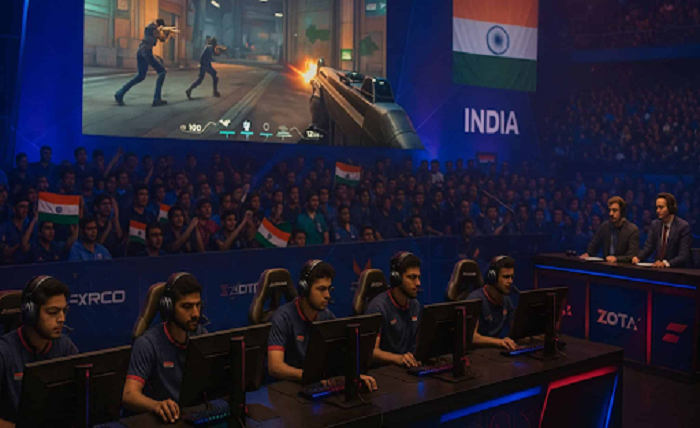Esports Boom in India: From Mobile Games to National Leagues

Over the last decade, the Indian gaming sector has undergone a fundamental transformation. What began as a niche interest among urban youth has evolved into a multi-billion-rupee industry encompassing competitive gaming, large-scale tournaments, and organized esports leagues. India’s unique demographic profile, combined with rapid digital infrastructure growth, has fueled this shift from casual mobile play to structured professional competition. Today, esports in India stands at a crossroads — expanding into traditional sports frameworks while integrating with global trends, such as data analytics, streaming platforms, and regulated betting systems.
Defining Esports in the Indian Context
Esports is defined as organized, competitive video gaming, usually featuring professional players or teams. While the global esports industry spans PC, console, and mobile platforms, India’s market is particularly notable for its strong emphasis on mobile gaming. This is largely due to the widespread availability of affordable smartphones and competitive mobile internet plans. Within India’s esports ecosystem, there is a diverse range of tournaments covering popular game genres, from battle royale to strategic contests, drawing both casual gamers and high-level competitors. Alongside esports, online casino games have also gained popularity, offering players an additional form of entertainment that combines skill and chance. Many players access these gaming experiences through platforms like Leonbet India, which provide integrated services for both esports betting and casino gaming
Historical Development and Early Milestones
The early 2010s saw the introduction of organized gaming tournaments in India, but these were largely small-scale and community-driven. The turning point arrived with the proliferation of affordable 4G internet in 2016–2017, coinciding with the release of highly competitive mobile titles.
Significant milestones include:
- 2018: Global esports brands began hosting India-specific tournaments.
- 2019–2020: Esports gained mainstream recognition, with national television and online streaming platforms broadcasting matches.
- 2022: The Indian government officially recognized esports as part of multi-sport events.
The Role of Mobile Gaming in Esports Growth
Mobile gaming’s dominance in India’s esports growth trajectory cannot be overstated. Factors contributing to this trend include:
- Accessibility: Low-cost devices and prepaid data packages.
- Cultural preference: Mobile gaming fits into daily commutes and irregular schedules.
- Developer focus: Game publishers prioritize mobile titles in the Indian market, offering localized events and rewards.
The popularity of battle royale formats (BGMI, Free Fire MAX) has created a high-spectacle environment, suitable for both live audiences and online streaming.
Transition from Tournaments to National Leagues
The esports industry in India is moving from sporadic tournaments to structured national leagues. These leagues function similarly to traditional sports championships, with seasons, team franchises, and consistent prize pools. Examples include:
- Multi-game leagues with divisions for mobile and PC titles.
- State-level competitions feeding into national championships.
- Cross-collaboration between educational institutions and professional organizers.
The move towards national leagues is significant because it brings:
- Stable income for players through contracts and sponsorships.
- Consistent fan engagement via scheduled events.
- Better data for industry stakeholders, which can also be leveraged in betting markets on platforms such as Leon Bet.
Economics of the Indian Esports Industry
India’s esports market is sustained by several revenue streams:
- Sponsorships – Technology brands, beverage companies, and telecom providers remain the top sponsors.
- Media rights – Platforms pay to broadcast exclusive matches.
- Merchandising – Branded apparel, gaming accessories, and collectibles.
- Ticket sales – Live events in urban centers.
- Betting integration – Esports betting platforms, including Leon Bet, have emerged as a parallel sector where match outcomes and in-game performance are used to create wagering markets.
The betting segment, while still under evolving regulatory frameworks, adds another economic layer, attracting both domestic and international interest.
Technology and Infrastructure Development
The esports ecosystem requires more than just fast internet. Critical components include:
- Game servers hosted in India to reduce latency.
- Professional-grade gaming arenas for offline events.
- Streaming technology for high-definition, low-lag broadcasts.
- Data analytics for player performance tracking, which is also leveraged in betting algorithms by platforms like Leon Bet to set odds and identify trends.
Player Pathways and Professionalization
As leagues mature, so do player development pathways. In India, this process now includes:
- Amateur circuits feeding into semi-professional leagues.
- Talent scouting through grassroots tournaments.
- Dedicated training bootcamps with coaching staff, nutritionists, and sports psychologists.
- Contract structures offering fixed salaries, performance bonuses, and streaming rights revenue.
This formalization mirrors global esports ecosystems, though adapted for the Indian market’s scale and mobile-first nature.
Streaming, Audience Engagement, and Media Platforms
Streaming platforms such as YouTube Gaming, Loco, and Rooter play a pivotal role in audience development. Esports audiences in India are highly interactive, often participating in live chats, polls, and community events.
From an industry perspective:
- Audience engagement metrics influence sponsorship deals.
- Viewer data can inform match predictions, which betting operators like Leon Bet may integrate into odds calculation models.
- Multi-language streams cater to India’s linguistic diversity, boosting reach.
Regulatory Environment and Challenges
While esports is recognized as a sport in India, certain challenges remain:
- Regulatory ambiguity around betting and fantasy esports markets.
- Intellectual property control — game publishers retain ultimate rights over tournament formats.
- Infrastructure gaps in rural and semi-urban areas.
- Player welfare — ensuring contracts and payment structures meet fair labor standards.
These issues influence both the stability of leagues and the sustainability of esports as a profession.
The Intersection of Esports and Betting in India
Globally, betting is a significant economic driver for esports, and India is no exception. While laws vary across states, international operators such as Leon Bet have provided Indian users with access to esports betting markets. Common bet types include:
- Match winner predictions.
- First kill or first blood outcomes in shooter titles.
- Map or round totals in games like Valorant.
From a market analysis perspective, this intersection offers data-driven insights but also introduces a layer of regulatory complexity.
Future Outlook: India on the Global Esports Map
India’s esports scene is expected to integrate more deeply into the global competitive landscape over the next five years. Factors driving this include:
- Cross-border leagues with South-East Asian and Middle Eastern countries.
- Greater investment from global publishers in Indian talent.
- Technological advancements enabling real-time performance analytics.
- Increased betting market sophistication on platforms like Leon Bet, mirroring developments seen in established esports regions.
Conclusion
The esports boom in India reflects a convergence of technological accessibility, a young and digitally engaged population, and the structural formalization of competitive gaming. While mobile games have been the foundation, the evolution into national leagues marks a significant shift towards sustainability and professional recognition. As the industry grows, both the entertainment and betting sectors — including operators like Leon Bet — are likely to remain intertwined, influencing the way esports is consumed, monetized, and regulated in the country.




